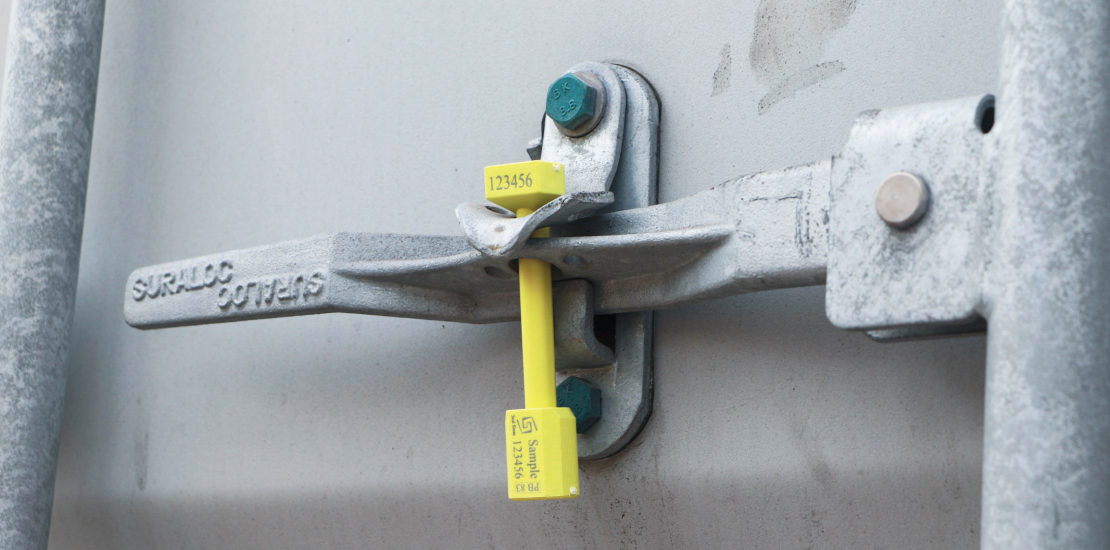- March 26, 2025
- Posted by: Hesam
- Category: Blog En

Container Seals: Ensuring Security in International Transportation
Container seals play a critical role in ensuring security in the international transportation and logistics sectors. These seals guarantee that the containers have not been opened and that the contents remain unchanged. Choosing the right seal significantly enhances security and integrity during the transportation process. At SEALSTONE, we provide high-quality container seals to meet all your security needs. For more information, visit our website: www.sealstoneco.com.
Seal Types and Suitability
Container seals come in various types, each with unique advantages suited for different transportation needs. When selecting the right seal, it’s essential to understand the following types and their appropriate uses.
Plastic Seals
Typically single-use and cost-effective. Plastic seals are ideal for lower-value cargo. However, for high-security shipments, metal or electronic seals are preferred for added protection.Metal Seals
Durable and suitable for high-value or sensitive cargo, metal seals made of steel provide superior security. These seals are ideal for long-term, high-risk shipments, and are a trusted choice for many companies like SEALSTONE.Electronic Seals
Equipped with RFID (Radio Frequency Identification) technology, electronic seals enable remote monitoring of container movements. These seals are perfect for high-security requirements and allow you to track and ensure the integrity of your cargo.
Security Level and Durability
The security level of a seal should be chosen based on the value and risk of the cargo being transported. When assessing security, consider the following:
Seal Material
Metal seals are generally more durable than plastic ones, offering enhanced protection. While plastic seals are affordable and easy to use, metal seals provide a higher level of security, making them a go-to choice for many of our clients at SEALSTONE.Seal Design
The design of the seal plays a crucial role in its security. Many seals, including those provided by SEALSTONE, include features such as breakage indicators or color changes that signal tampering or opening.Certification and Standards
It’s important that seals meet international standards and certifications. At SEALSTONE, all our seals comply with stringent industry regulations to ensure their reliability and security.
Ease of Use and Application
When selecting a seal, consider both its installation process and its application:
Easy Installation
Seals should be simple to install. Plastic seals are typically quick to apply, whereas metal seals may require more effort. Electronic seals from SEALSTONE may involve more complex setup, requiring technical knowledge and equipment.Lock Mechanism
A secure and reliable lock mechanism is essential for maintaining seal integrity. Seals provided by SEALSTONEare designed with robust mechanisms to ensure effective operation.Monitoring Capabilities
Electronic seals allow for real-time monitoring of your container’s status. This feature is available with advanced SEALSTONE electronic seals, providing peace of mind throughout the shipping process.
Environmental Conditions and Durability
Container seals must endure a variety of environmental conditions, especially in international shipping:
Weather Conditions
Seals should resist extreme weather. Particularly in maritime shipping, SEALSTONE’s seals are built to withstand the challenges of humidity, salt exposure, and fluctuating temperatures.Chemical Resistance
Our seals are engineered to be chemically resistant, ensuring long-term durability and protection for your cargo, no matter the substances encountered.Mechanical Impact
Transporting goods often involves mechanical shocks and impacts. SEALSTONE offers seals that are engineered for durability, protecting your cargo during the most challenging transport conditions.
Customs and Legal Requirements
In international logistics, seals must comply with various legal and customs regulations:
Legal Regulations
Different countries may have varying legal requirements for container seals. SEALSTONE ensures all our seals meet international legal standards, facilitating smooth customs processing.Customs Inspections
Customs authorities routinely inspect seals. Choosing SEALSTONE ensures that your seals are always compliant with customs inspection standards, ensuring hassle-free transport.
Cost and Economic Factors
The cost-effectiveness of seals should be evaluated in relation to your budget and security needs:
Cost
Plastic seals are affordable, but for high-value shipments, metal seals or electronic seals from SEALSTONEprovide the added security that justifies the investment.Longevity and Investment
Although more expensive upfront, metal and electronic seals offer long-term value due to their durability and enhanced security features.
Supplier Selection and Quality
The quality of the seals depends significantly on the supplier:
Supplier Reliability
When selecting seals, it’s important to work with reputable suppliers. At SEALSTONE, we are committed to providing high-quality, reliable seals, backed by certifications and excellent customer feedback.Quality Control
All seals from SEALSTONE undergo rigorous quality control to ensure their effectiveness and reliability throughout the transportation process.
Choosing the right container seal is crucial for securing your cargo during international transportation. By considering factors such as seal type, security level, ease of use, environmental durability, legal compliance, cost, and supplier quality, you can ensure your goods are safely and securely transported. SEALSTONE provides the best solutions for all your sealing needs. Visit us at www.sealstoneco.com to learn more and get started today.
